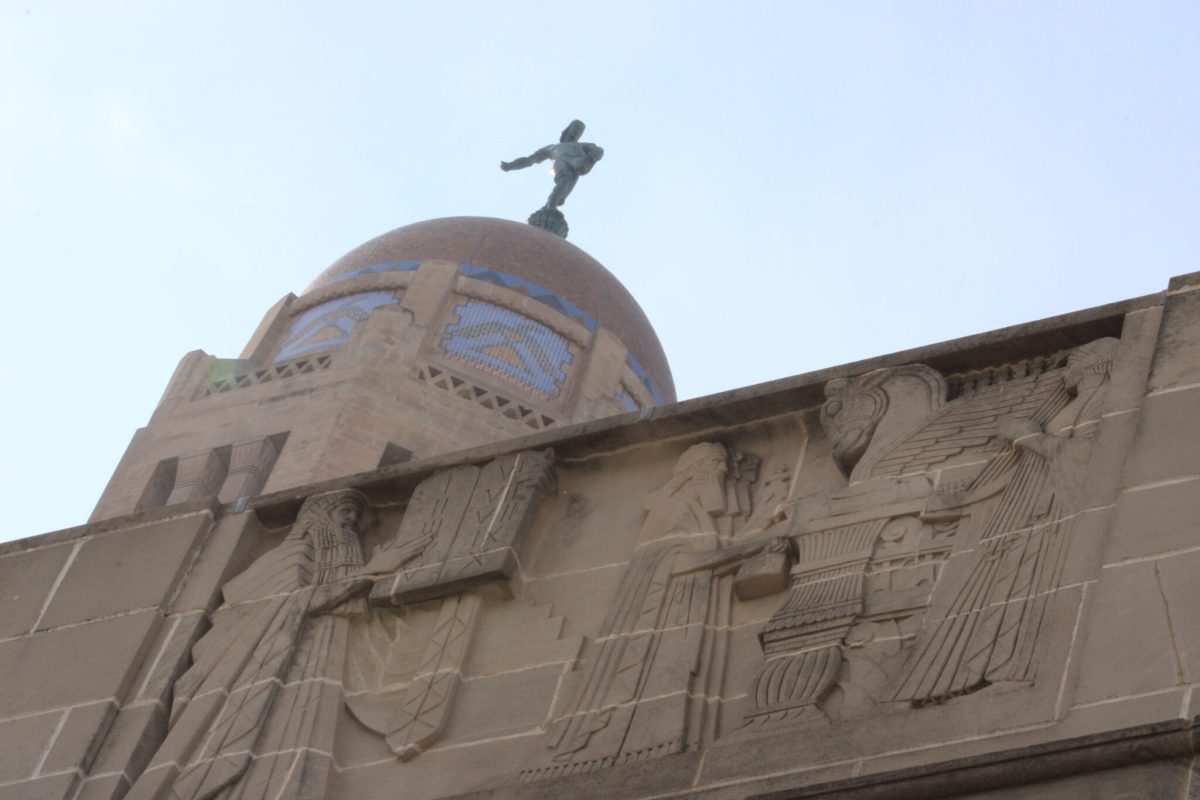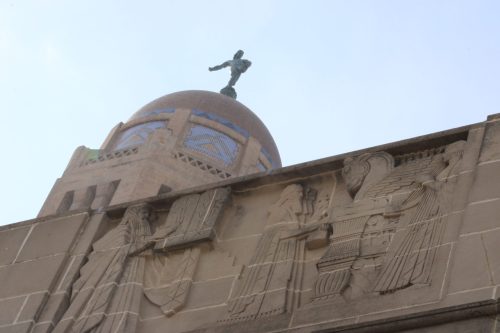
LINCOLN — The Nebraska Legislature’s Education Committee has been trying for a month to get one of its packages of education proposals out of committee and onto the floor. But the past few executive sessions have been tense, and committee members remain divided.
Now, the committee chair, who until last week had been optimistic about the package’s chances, says the bill that includes giving teachers more time off to deal with significant life events is running out of time to reach the legislative floor this year. The obstacle: lawmaker objections to including one senator’s priority proposal that would allow K-12 students to be excused during the school day for off-site religious instruction and coursework.

The Ten Commandments on the Nebraska State Capitol. April 17. 2025. (Juan Salinas II/Nebraska Examiner)
Two Democratic-aligned lawmakers and one Republican on the committee have questioned the inclusion of the religious-themed bill in the package. But the Education Committee chairman, State Sen. Dave Murman of Glenville, continues to emphasize the importance of including the bill.
The inclusion of Central City State Sen. Loren Lippincott’s Legislative Bill 550 was part of a “deal” involving the state Legislature’s Retirement Systems Committee, one Democrat and other Republicans on the committee, and the state’s largest teachers union.
Earlier in the session, people weighed in during a public hearing about a handful of religious-themed, school-related proposals from Murman, Lippincott, and State Sen. Glen Meyer of Pender.
Murman’s proposal would require displaying the Ten Commandments in every state school. Meyer’s bill would require “In God We Trust” to be displayed prominently in K-12 schools. Lippincott, in addition to the “release time” bill, proposed allowing school districts to employ unlicensed religious chaplains to counsel students.
Murman’s Ten Commandments proposal follows a successful effort by conservatives in Louisiana requiring it last year, the first new state law requiring the change in decades. Other states are attempting to do the same.
Lippincott’s “release time” bill, LB 550, is part of a national lobbying effort by a Christian education organization, Lifewise Academy, with populist right ties. It also indicates that a decades-old push to infuse more religion into schools still has a pulse in the Nebraska statehouse.
In other states, resistance from teachers, advocates, and lawmakers to putting more religion in public schools has been used to build political support for taxpayer-funded vouchers or school choice for K-12 students to attend private schools. The latest victory for school vouchers came in Texas, where Gov. Greg Abbott signed a voucher bill into law, ending a years-long battle. Nebraska voters repealed a similar voucher law in November, though lawmakers have pledged to keep trying to pass a replacement.
Some religious experts said Lippincott’s LB 550 would help “already privileged groups,” and a few lawmakers from both sides of the aisle shared concerns about blurring the line between church and state. A few said its passage could lead to the adoption of other religious bills. One GOP lawmaker who has proposed religious bills said LB 550 would just be the start.
“If we let these things go by unchecked, it can absolutely lead to larger bills down the road,” State Sen. George Dungan of Lincoln said.
The Education Committee effort to include Lippincott’s bill in the package could signal a tipping point toward more openness in the Legislature for passing religious-themed bills. Senators this year have debated several bills with culture war undertones, including proposals relating to transgender youth and lab-grown meat some call elitist and unnatural. Gov. Jim Pillen has said in the past that Catholics and Christians should “have more courage” to stand up for Christian values.
Nebraska’s religious bills mirror a national push by Republican state lawmakers that has been emboldened by President Donald Trump and recent U.S. Supreme Court decisions that appear to have altered the legal landscape for such proposals in schools.
“Release time” proposals like Lippincott’s LB 550 have been legal since the 1950s. A 1952 ruling by the high court held that New York City schools could allow students to be “released” for religious education and activities outside of school with parental consent.
Deal blown up
Murman aides had been confident for weeks that the broader education package would advance out of committee, repeatedly saying they had the votes to get out, including from State Sen. Margo Juarez of Omaha, a Democrat.
Juarez, who deal brokers and Republicans on the committee had viewed as a key vote for the package, told the Nebraska Examiner she flipped positions to a likely “no” during a roughly month-long effort to get the package to the floor.
Juarez said she was misled about why the Lippincott bill needed to be included. She said she was under the impression that the committee was required to include all of the bills discussed during the executive sessions.
Republicans on the committee say they had been pretty clear about the terms of the deal.
Murman said he secured a “deal” with the Retirement Systems Committee to combine LB 550 with a bill from State Sen. Ashlei Spivey of Omaha that would help schools find more long-term substitutes so teachers could take paid time off around significant life events.
Lincoln Sen. Beau Ballard, chairman of the Retirement Systems Committee, said his deal was with education “stakeholders.” He said he wasn’t part of the negotiations on the package’s parts. Juarez also confirmed the Nebraska State Education Association was aware of the deal and could live with Lippincott’s proposal, if amended.
Tim Royers, president of the Nebraska State Education Association, had said earlier that finding common ground regarding religion is a centuries-old issue in America, but “the battleground shouldn’t be in our public schools.”
Royers on Friday said the union would only accept the “release time” proposal if its language shifted from “shall” adopt a policy to “may.”
Democrats on the committee said Murman’s strong-armed approach about needing LB 550 in the package caused the stalemate. Lippincott’s bill was chosen because it was seen as less controversial than the three other religious-themed proposals, people familiar with the package said
On religion in schools, Nebraska Republicans seem more conflicted than some of their red-state counterparts. Some Nebraska Republicans in the Legislature — not on the committee — privately told the Examiner Lippincott’s bill could be a step too far for them.
Lippincott has said the bill would “empower parents by giving them a stronger voice in their children’s education.” Fellow Education Committee member Meyer called LB 550 a “good first step.”
‘America is always losing its way’
Currently, 12 states require school boards to adopt release-time policies for off-site religious instruction, while 18 other states have laws or regulations allowing boards to adopt release-time policies. Nebraska, Washington, D.C., and 19 other states have no laws requiring or prohibiting release time for such instruction. In those states, parents or religious organizations can petition their local school boards to establish a program, but the boards could reject it.
One national tie to Lippincott’s bill is LifeWise Academy, an Ohio-based religious instruction program.
During a National Association of Christian Lawmakers meeting last December, the group proposed a model bill on “release time” from school. After Lifewise Academy proposed the model bill, NACL approved embracing it. Lippincott’s bill is similar.
Lippincott confirmed that his bill is modeled after other states’ “release time” legislation. Jesse Vohwinkel, LifeWise Academy’s Vice President of Growth, testified in favor of Lippincott’s bill during its public hearing in February.
LifeWise serves over 630 schools in 31 states, it told the NACL at its meeting. LifeWise has seen its revenues increase from $2 million in 2021 to $35.3 million in 2024, according to the group’s IRS reports.
“We see a viable path of reinstalling Bible education for the public school system across the nation,” Joel Penton, the founder of LifeWise, said during a Family Research Council’s, a Right-Wing Think Tank, podcast last year.
LifeWise has received legal support from rightwing groups like America First Legal and has allied with some groups on the populist right, including Moms for Liberty. One Democratic-aligned lawmaker said during a recent legislative discussion that LB 550 catered to Lifewise.
Nebraska Family Alliance, a lobbying group that has a history of being against abortion and advocating Biblical values, supports LB 550. On his podcast, Nate Grasz, the group’s executive director, said Nebraska parents must have the same “rights and opportunities” as those in other states.
“That must include giving their children a religious education,” Grasz said.
Meyer said the Lippincott proposal could provide school boards “cover” for those who wanted to implement a policy but didn’t because of potential pushback, since every school would be required to do so.
University of Nebraska-Lincoln Religious Studies Professor Max Mueller said the Family Alliance and other supporters of similar bills appear to want to blur the lines between church and state.
Grasz interviewed Vohwinkel, who said the group “enables communities to provide Bible education to their public school students during the middle of the school day.”
Lippincott proposed a similar bill during the last legislative session, but it was bottled up in committee.
“We aim to support families who seek religious education with their children while strengthening character education in our public schools, fostering a well-rounded and inclusive learning environment for every student,” Lippincott said.
He said the difference with his bill this year is that it would cost school districts nothing and that all religious studies would be conducted off school grounds.
“We got away from some of the things that made this country great,” Meyer said.
That echoes what he said during his LB 122 hearing: “We have somewhat lost our way on values.”
Narrative matters
Mueller said this type of framing of a type of moral decline, known as declension narrative, has often been used throughout U.S. history.
“America is always losing its way, and most often it’s lost its way from its founding principles of this kind of Christian experiment … of Christians governing themselves,” Mueller said.
Meyer said he didn’t expect his “In God We Trust” bill to be included in an education package because it was “controversial.” But he said he would not give up. Mueller said some lawmakers are more candid than others about their goals regarding these religious bills.
“Which is to have schools promote a very specific set of ideas about religion, ideas, and about gender and sexuality,” Mueller said.
State Sen. Victor Rountree of Bellevue, a pastor and Democrat, said he doesn’t think the state should try to infuse more religion into schools. He said such decisions should be left up to school districts and families.
“I send my kids to school to be educated,” Rountree said. “If there were things in the public school that went against how I felt religiously, then I pulled my kids out or had them with an alternative course of instruction.”
Dungan said he has seen an increase in “extreme social bills” during his time in the Legislature. He pointed to term limits as a reason why the statehouse is seeing more “model bills,” because lawmakers are newer and less independent.
“When you have either lobbyists from Nebraska or other states able to influence senators at a greater rate, you’re going to see more bills like this get introduced,” Dungan said.
Murman said the committee could consider an amended version of Lippincott’s bill as early as this week. Time is not on senators’ side, with many of the remaining days of the session dedicated to the budget and other contentious bills.
Examiner reporter Zach Wendling contributed to this report.
Nebraska Examiner is part of States Newsroom, a nonprofit news network supported by grants and a coalition of donors as a 501c(3) public charity. Nebraska Examiner maintains editorial independence. Contact Editor Aaron Sanderford for questions: info@nebraskaexaminer.com.






